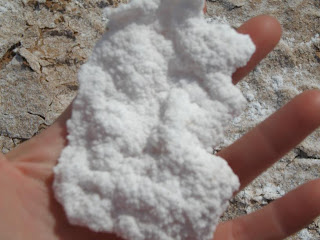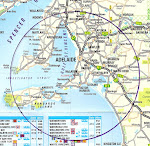Dehydrated Spaghetti bolognaise that can be rehydrated by adding hot water, easy, no chopping, no huge ingredient list, delicious result. Served with Pasta
Dehydrated curry to be eaten with cous cous (leftover in pantry)
Eggs gone wrong - I thought it would be good to boil up a heap of hard boiled eggs for the journey. Two cracked immediately on entering the boiling water, and they were not cooked sufficiently, so they were soft boiled!
I found this disaster of mouldy figs when I was looking for snacks to take on the trip. I obviously did not dehydrate them for long enough.
The dehydrated pear suffered the same fate, I am not sure if this is because they were not dried enough or they were still warm when I packed them away. Such a waste, luckily we have worms!
This was the last straw, and I was in a flood of tears just before our trip. It was actually a lot of work preparing the food for the camp. I realised that I could not rely on acessing local food on our journey, so would have to take all of our own. Usually I would buy packaged convenience foods and canned foods for the trip to make life easier, and we would look forward to picking up snacks at bakeries etc. along the way. This trip for the first time, I took fresh veg from the garden, including lettuce, tomato, cucumber, capsicum, basil and rocket. Usually I don't bother too much with fresh foods because I don't think they will last. We took Michael's Mum's car fridge which took up a lot of room on the back seat, and did not work particularly well. We ended up using it like an esky and filling it with ice. We also took our esky which I filled with frozen milk, frozen yoghurt and frozen butter. I was amazed at how well the fresh food lasted. We still had fresh milk untill the 4th day, and the (BD lemon myrtle) yoghurt was a lovely after dinner treat on the 3rd day, and the lettuce, cucumber, tomatoes and capsicum lasted until day 5. If I hadn't accidentally left them in the fridge of the cabin in Wilpena Pound, we would have had salad sandwiches for lunch on the way home! I was very impressed with the freshness of the veg. I am not sure if they lasted so well because I picked them the day before we left home? They were all packed unwashed in snap lock bags, or airtight plastic containers. I did pick up the following at our local fruit and veg shop in Aldinga, and took the lot with us. The strawberries from Mt Compass were disappointing, most of them were thrown out on day 2 as they deteriorated very quickly in our makeshift fridge.
The honey is from Kangaroo island, so I assume it is Ligurian honey, and it seemed to be the same price as we pay for our local honey lady honey, so I wanted to try it. Haven't opened it yet.
Parachilna
Our first night we spent in the overflow cabins (Atco huts) at The Prairie hotel in the Flinders. The boys had a room with two bunks and the adults had separate rooms, it was very basic but comfortable. We could not resist eating dinner in the hotel, Michael and I shared the Feral Grill - kangaroo, camel, and emu, thinking it would be pretty local (it wasn't, only the Kangaroo was) but we did enjoy sharing a bottle of local wine though (as local as we could get) Bundaleer Shiraz from Jamestown. Michael and Tom also tried a "local" beer Knappsteins from the Clare Valley - very nice, but very expensive - at $10 per 375ml bottle!
It was difficult to really get a sense of the different tastes of the game as the sauce they came with was so rich. It all tasted great though.
Bush Camp Arkaroola Nature Sanctuary
Camp fire potatoes, and beetroot, MclarenVale wine from home, liver jerky, pasta, farmer's market mushrooms & garlic, with Paris Creek Nuage Blanc, followed by marshmallows roasted on the fire. (who brought those?)

Lake Frome
We decided to visit Lake Frome to check out the bird life, and see the lake with water in it as we were told that the recent rains had introduced water to the lake which is an infrequent occurence. This is what we found.
No water, no birds, just salt and very cute lizards that the boys were impressively adept at catching. So we spent our time productively. Painstakingly and carefully gathering salt for our table for the next few months. We used state of the art precision tools to scrape the surface salt off the lake.
The salt is very tasty if a little difficult to shake onto food.
Bush Tucker
on the way to lake Frome (along a sandy dirt track) we spotted a tree laden with fruit, is it a bush orange?
on the same track we found "bush bananas", the green fruit, that grows on a vine like a cucumber, and looks like a small cucumber.
Four Leaf Organic Mill
On the way home we stopped off at Four Leaf to do some Blog research and buy some items for our pantry.
Rosemary Dunn, the owner of Four Leaf Milling. She patiently told us about her products, and where they are grown, and it turns out that, like most mills, the grains are mixed in order to keep enough product available to meet demand. Some of their growers are Biodynamic and some are Organic, but because the grains are mixed, they can only label them organic. Many small growers are based within our radius, but their larger producers are located interstate, mostly in Victoria, and again the grains are mixed. The following grains are grown locally and are not mixed with grains from interstate.
pearl barley is grown locally is used to thicken soup, and is a good substitute for rice. Makes a good risotto apparently.
Egyptian Gold wheat was found in an Egyptian tomb, and grown successfully by a neighbour. It is also known as Kamut, and is an ancient grain, it will last many years in the pantry if stored properly, but they say conservatively, it lasts one year. It makes a high protein flour and has a sweet, nutty flavour (this nutty flavour is stronger in the Egyptian Gold than the spelt), and is excellent for pasta and bread. It has similar properties to Spelt flour and can be tolerated by many people with wheat sensitivities.
Michael made a loaf with this flour and it did not rise much at all but it tasted fine and had a lovely texture, and brown colour, it has less gluten, which makes it rise less.
Barley flakes are a good substitute for oats, and can be used to make porridge and museli.
Barley flour is a good alternative to corn flour as a thickening agent.
So these are the products we can use this year if we want to eat organic.
Happily, most of these products are available through the Food Co-op in Willunga, but Rosemary offered to deliver any other products that we cannot get in Willunga directly from the mill.
Us with Rosemary






















No comments:
Post a Comment